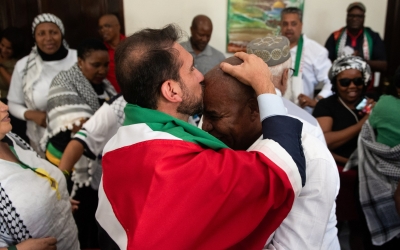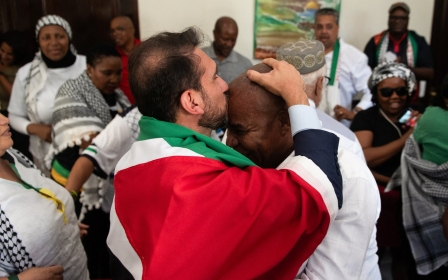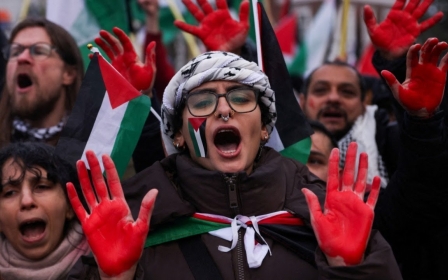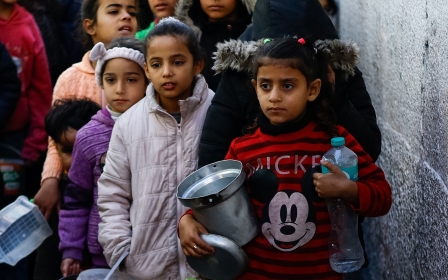ICJ's Israel genocide case ruling met with disappointment in Gaza
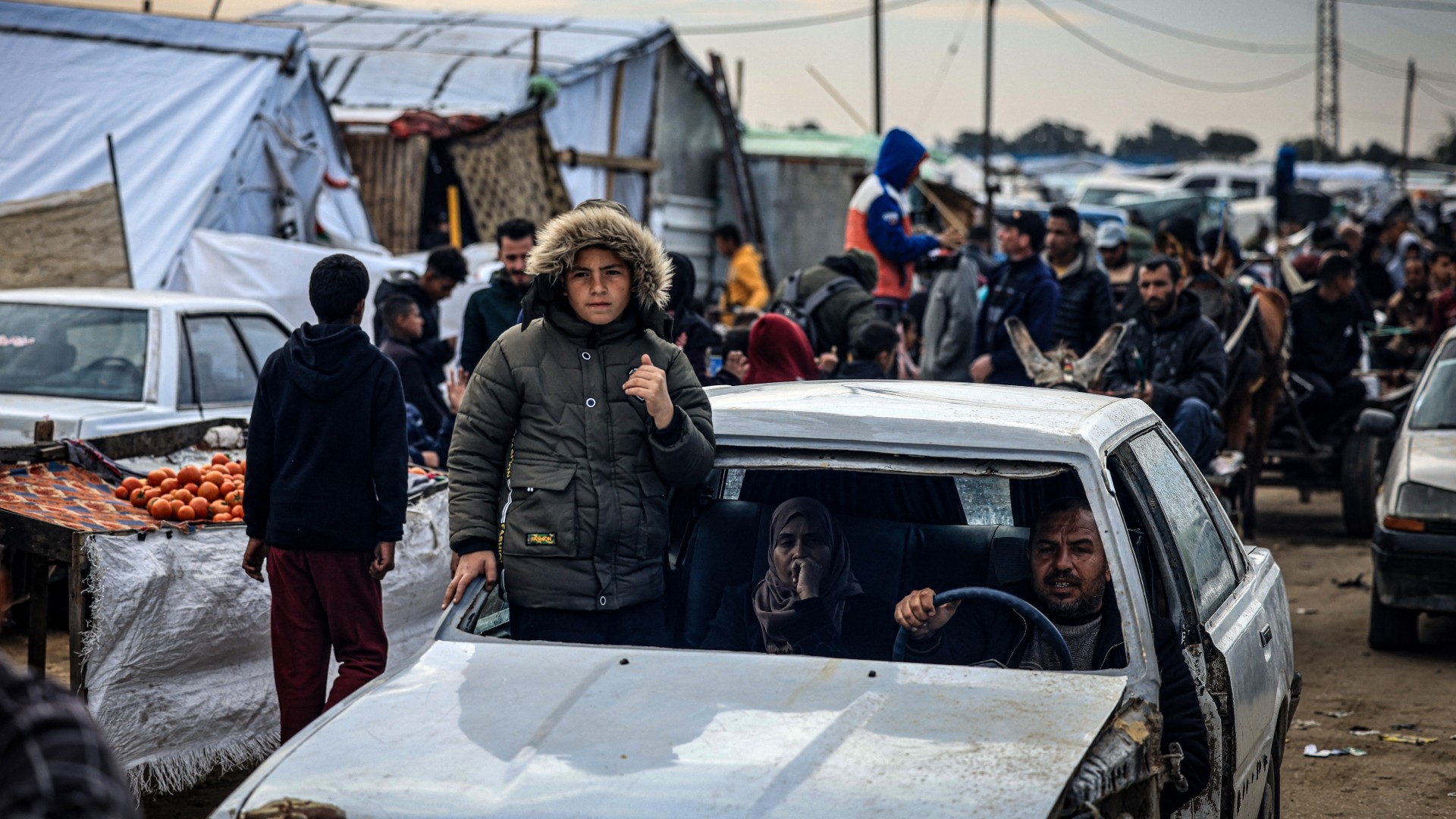
There was a feeling of disappointment and trepidation in Gaza after the International Court of Justice (ICJ) delivered its interim ruling on South Africa's genocide case against Israel.
The Hague-based court ordered on Friday that Israel take all measures within its power to prevent genocide in Gaza, as well as allow aid to enter the enclave.
However, it fell short of calling on Israel to halt its military operations in the strip, something many had hoped would be the case.
Middle East Eye's reporters in Gaza said while the case had initially felt historic and significant, the interim verdict fell below many Palestinians' expectations.
New MEE newsletter: Jerusalem Dispatch
Sign up to get the latest insights and analysis on Israel-Palestine, alongside Turkey Unpacked and other MEE newsletters
"The court gave Israel another month to continue killing, displacing, and starving us, and since it approved the entry of humanitarian aid, it thus gives Israel an opportunity to continue to exterminate us while supplying us with scraps of the food, medicine, and essential life necessities we need."
Mousa said that Palestinians she spoke with in Gaza had hoped for the court to order an "immediate and urgent ceasefire".
Reporter Ruwaida Amer added that displaced people in Gaza were left feeling frustrated and dispirited following the decision.
'The global consensus against the Israeli crimes that we have witnessed is unprecedented'
- Ahmed Sammak, journalist
"When South Africa began to move internationally against the genocide in Gaza, there was a feeling of hope," she said.
"Unfortunately, as the war continues, we in Gaza have lost all hope in the world after its silence in the face of the crimes that have been taking place for more than three months."
She said that people in Gaza had lost their "spirit and passion for life" because of the "horrors" they had witnessed and lived through.
While the ruling by the ICJ is legally binding, there is little the court can do to force Israel to comply with it.
States could call on the UN Security Council to implement separate sanctions on Israel if it failed to comply with the ICJ's orders - but there is a chance such a move could be vetoed by the US.
Historic day
MEE's Gaza correspondent Maha Hussaini said that, nevertheless, it was a historic day for Palestinian victims of Israeli crimes, in particular journalists who had been targeted and killed.
"For the first time... the international community is actually admitting that Israel is accused of committing genocide, which is a very significant milestone," she said.
But she cautioned that displaced Palestinians felt the court did not go far enough.
"Many of them feel failed, yet again, by the international community, as the court has not called for an immediate ceasefire," Hussaini said.
"Preventing acts of genocide would necessarily mean halting indiscriminate attacks on one of the most densely populated areas on Earth."
Since the war broke out on 7 October, more than 25,000 Palestinians in Gaza have been killed, including over 10,000 children.
'Israel's immunity has ended'
Walaa Sabah, another MEE contributor from Gaza, said the decision did not go far enough.
"While it feels optimistic that ICJ officially declared its jurisdiction over the case placing Israel as a defendant for committing genocide, the provisional measures taken are minimal and partial," she said.
Sabah said the ruling was akin to telling Israel that it could "kill the Palestinians, but do not post it on TikTok".
"[The rulings] are all recommendations. None of them are mandatory, and it is up to Washington and Israel and their allies if they want to take action," she added.
While many were disappointed, some in Gaza felt hopeful after the court ordered Israel to take measures to prevent genocide.
"The decision is very important," a Palestinian journalist in Gaza who preferred not to be named, told MEE.
"Israel’s immunity has ended, and this is the beginning," they said.
"It must not be evaluated solely from the perspective of the lack of a ceasefire, because the court relied on the fact that the two parties are a state and a movement, and the court has the ability to judge states only."
The ICJ only has jurisdiction over states, and can therefore give orders to Israel, but not to Hamas, a non-state entity.
"The global consensus against the Israeli crimes that we have witnessed is unprecedented," said MEE journalist Ahmed Sammak, who is from Gaza.
'Israel did not listen to any calls for a ceasefire or an end to the starvation. So what can now force them to stop?'
'Israel did not listen to any calls for a ceasefire or an end to the starvation. So what can now force them to stop?'
- Mohammed al-Hajjar, journalist
"I hope that this judgment by the ICJ will mark a significant step for the international community in putting an end to the impunity of Israel when it commits crimes against Palestinians."
MEE's Gaza correspondent Mohammed al-Hajjar said that while the ruling “means a lot” to Palestinians in Gaza, there were question marks as to whether Israel would abide by it.
“We have seen Israel bypass laws for the past 111 days and commit war crimes, Israel did not listen to any calls for a ceasefire or an end to the starvation. So what can now force them to stop?” he noted.
Despite this, Hajjar said that Palestinians were grateful for the action taken by South Africa.
“We thank South Africa a lot for their bravery and standing with us, especially against Israel and the US because Israel is not acting alone. We also hope in the future that the US will be held accountable for encouraging and supporting Israel in this war."
Middle East Eye delivers independent and unrivalled coverage and analysis of the Middle East, North Africa and beyond. To learn more about republishing this content and the associated fees, please fill out this form. More about MEE can be found here.


